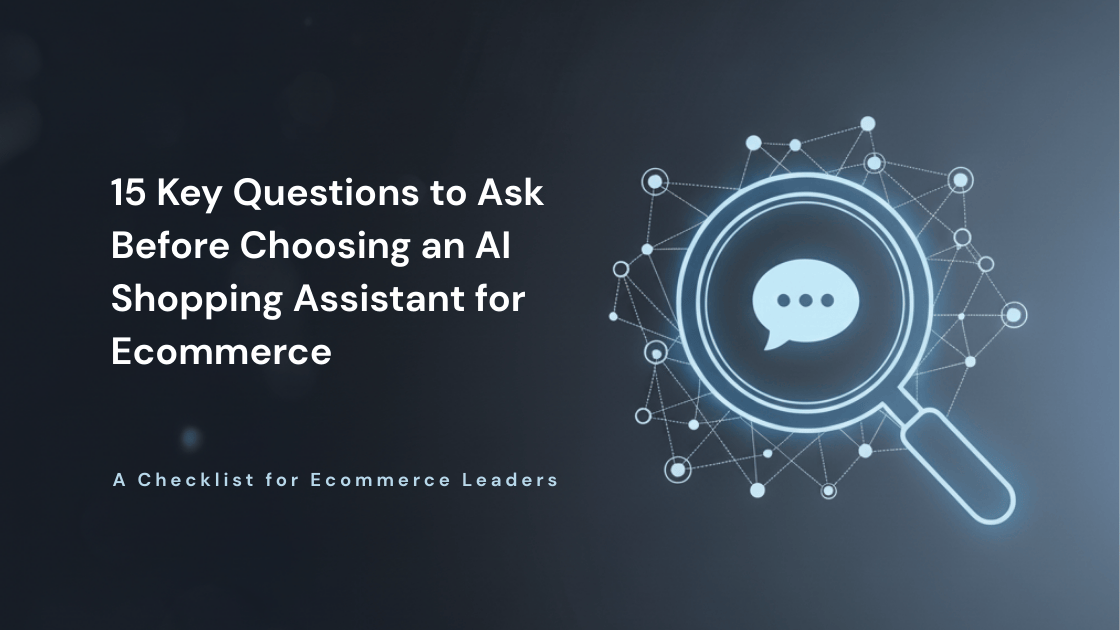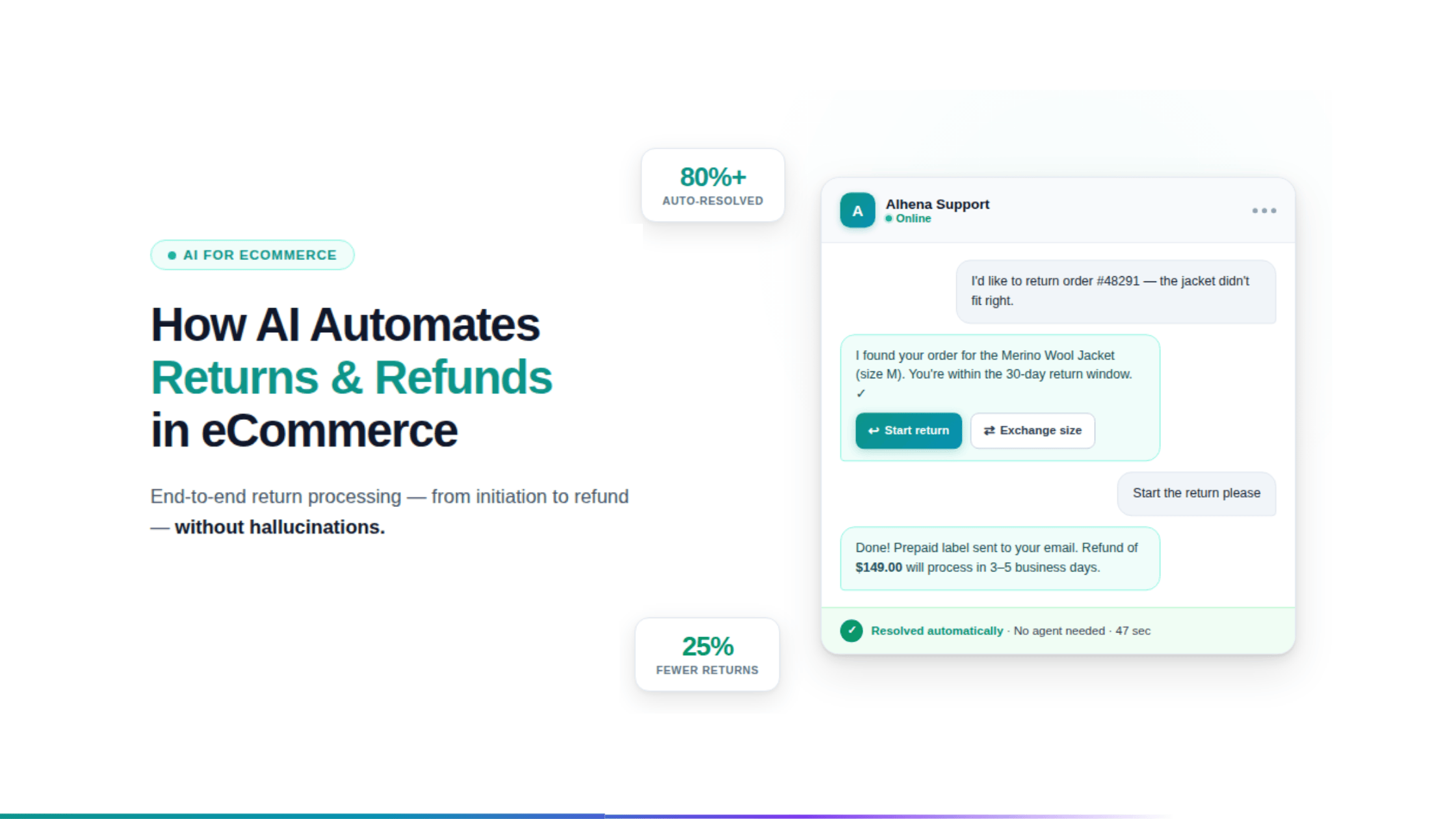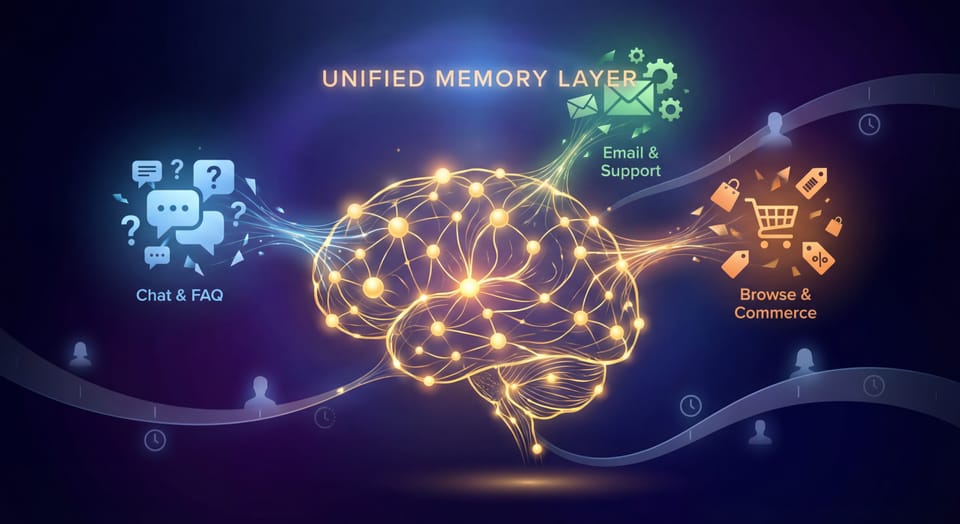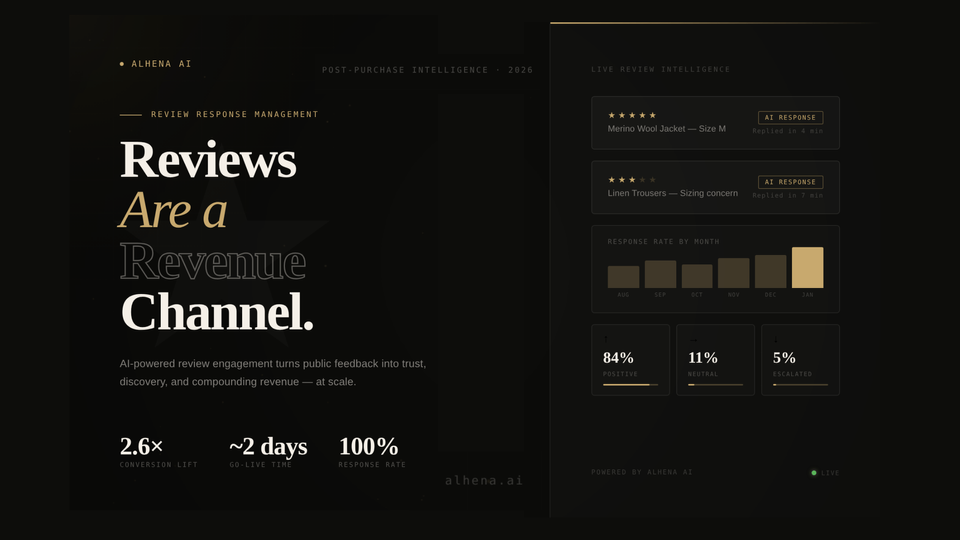15 Key Questions to Ask Before Choosing an AI Shopping Assistant for Ecommerce
Discover 15 key questions every brand should ask before adopting AI from integrations and pricing to ROI and data security with insights from Alhena AI.

Before choosing an AI shopping assistant, ecommerce brands should evaluate accuracy, intent understanding, product discovery depth, real-time data access, brand control, and measurable revenue impact. The best ecommerce AI assistant acts as a storefront copilot, guiding shoppers through conversational commerce and shoppable chat without hallucinations.
TL;DR
Most AI shopping assistants fail not because of AI quality, but because brands ask the wrong questions. This checklist mirrors how e-commerce leaders evaluate the best AI assistants in 2026, focusing on decision guidance, trust, and impact across the shop journey.
Beyond the Buzz: Your Guide to Making the Right Choice
When ecommerce leaders hear the buzz about AI shopping assistants, the first thought is often, “This looks promising, but how do I know if it will actually work for my business?”
AI shopping assistants are no longer futuristic add-ons; they’re becoming conversational AI agents that shape how ecommerce brands sell, support, and scale customer experiences.. From guiding product discovery to reducing customer support backlogs, AI is redefining digital shopping experiences.
But many brands rush into AI adoption without asking the right questions. They get dazzled by “AI power” features but later run into issues with integration, pricing, or scalability.
1. How does an AI shopping assistant integrate with existing platforms?
Adoption isn’t about starting from scratch. It’s about plugging AI assistant directly into your online shop ecosystem from Shopify, Salesforce to Zendesk, Gorgias, or Freshdesk.
At Alhena AI, brands get up and running in days, not months, because we design for fast compatibility with e-commerce platforms and existing helpdesks.
Here’s how an advanced platform like Alhena AI integrates into your existing tech stack:
- E-commerce platforms: Shopify, WooCommerce, Magento, BigCommerce, pulling live product catalogs, reviews, and inventory data in real time.
- Helpdesks and CRMs: Zendesk, Salesforce, Gorgias, Freshdesk, HubSpot, and Intercom syncing past tickets, macros, and FAQs to train the AI instantly.
- Messaging and channels: Website chat, email, WhatsApp, Slack, and social DMs give customers consistent responses no matter where they reach out.
- Data flow and automation: Alhena AI connects through secure APIs and webhooks, enabling real-time data ingestion from your product feeds and help centers with zero manual setup.
Unlike legacy chatbots that require weeks of setup, Alhena AI is plug-and-play, designed for speed, compatibility, and zero data friction. Most e-commerce brands go live within days, not months.
Key questions to ask vendors:
- Do you offer native integrations with our e-commerce and helpdesk tools?
- Is the data transfer real-time, or does it require manual updates?
- How long does deployment typically take: days, weeks, or months?
A seamless integration ensures your AI assistant isn’t just another widget; it becomes the connective layer that powers personalized shopping journeys, cross-channel consistency, and instant support experiences across your entire e-commerce operation.
2. Will customers still get a live chat experience during human handoffs?
Absolutely, shoppers today want speed and empathy. Their biggest frustration? Getting “stuck with a bot” that won’t let them reach a human. AI should never feel like a wall; it should be a bridge.
At Alhena AI, this seamless human handoff is powered by integrations with Freshdesk, Zendesk, Salesforce, and Gorgias, ensuring your support team always has the full conversation at their fingertips.
Ask vendors:
- Does your AI preserve conversation history and customer data during handoff?
- Can customers request a human at any point?
- How does the system manage after-hours requests?
At Alhena AI, we emphasize seamless human handoffs. A truly intelligent AI assistant doesn’t replace human empathy; it amplifies it. The handoff should feel effortless to your customers and invisible to your team.
3. Can the AI handle both pre-purchase and post-purchase support?
Yes, and this is exactly where most e-commerce chatbots fall short. Traditional bots handle simple FAQs, but a true AI shopping assistant should create value at every stage of the customer journey.
The top 5 customer chatbot queries are order status, refunds, product info, and discounts. But what about sales? Most chatbots stop at FAQs. But modern AI assistants must drive sales before purchase and reduce tickets after purchase.
Most tools focus only on answering questions. A true AI shopping assistant supports the full purchase lifecycle.
Here’s how Alhena AI does both:
Pre-purchase:
- Guides shoppers with product discovery journeys, helping them find the right fit, size, or variant in seconds.
- Answers detailed questions instantly, from product details to comparisons.
- Delivers personalized recommendations using behavioral data, boosting conversions and AOV.
Post-purchase:
- Automates 90% of repetitive requests like order tracking, returns, exchanges, and cancellations.
- Handles address changes, subscription updates, and troubleshooting all without human escalation.
- Keeps agents focused on high-value conversations while customers enjoy instant, accurate responses.
The outcome? A smoother, more connected customer experience that drives loyalty and revenue not just efficiency.
Ask vendors, “What percentage of queries can your AI resolve without agent escalation?”
4. How accurate is the AI, and how does retraining work?
Accuracy is everything in e-commerce AI. Shoppers trust what your assistant says, and even a single wrong answer can cost a sale or damage your brand’s credibility.
When it comes to retraining, Alhena AI makes it effortless:
- Connect your help center, FAQs, macros, and ticket data directly to your dashboard.
- Retrain automatically (weekly or monthly) or manually with a click.
- Exclude or blacklist outdated URLs or articles anytime, no full retraining needed.
- Monitor performance and flag inaccurate responses for instant review.
This continuous learning loop keeps your AI assistant evolving with your brand, not behind it.
Ask vendors:
- How often does your AI retrain itself?
- Can we control what data it learns from?
- How do you ensure brand tone and factual accuracy remain intact over time?
With Alhena AI, brands maintain full control over training data, tone, and accuracy, ensuring every answer your customers see is as precise as your brand promise.
5. How much human supervision or management does AI need?
Smart AI shopping assistants like Alhena AI can manage 24/7 multilingual support for FAQs, order tracking, and product queries, freeing teams from repetitive work. But humans still play a key role in handling complex, emotional, or high-value conversations that require empathy and judgment.
Alhena AI ensures smooth human handoffs, transferring full chat context so agents can pick up right where the AI left off.
Best practice:
- Let AI handle 80–90% of common queries.
- Keep humans for exceptions and brand-sensitive cases.
- Review insights regularly to refine tone and accuracy.
With the right balance, you don’t replace people, you make them faster, sharper, and more effective.
6. How flexible is pricing when we scale up or down during seasonal fluctuations?
Ecommerce volumes rise and fall, your AI costs shouldn’t. One of the most-searched questions on Quora is, “Do chatbots really save money for ecommerce stores?” Pricing is where many AI projects fail.
Alhena AI offers usage-based pricing that scales with your business. You pay per conversation or resolved interaction, not per seat, so costs stay predictable even during busy seasons. When demand slows, spending adjusts automatically, no wasted licenses or penalties.
Enterprise plans include custom terms and volume discounts, making it easy to manage seasonal spikes or sudden surges without hidden fees.
Ask vendors: “What happens if we scale up or down? Are there hidden costs?”
With Alhena AI, scaling up or down is simple; your pricing flexes exactly the way your business does.
7. Is this AI adaptable to voice commerce or future conversational platforms?
Absolutely. Alhena AI is built for the future of conversational commerce, not just chat.
It already supports website chat, email, messengers, and help desks like Zendesk, Gorgias, and Intercom, and easily extends to Slack, Discord, and Microsoft Teams.
Most importantly, Alhena AI is voice-ready designed to integrate with emerging voice commerce platforms as they evolve, keeping your brand connected wherever your customers choose to engage.
Ask vendors:
- Does your AI support both chat and voice-based interactions?
- Can it integrate with platforms like Slack, Teams, or Intercom?
- Is it designed to adapt to emerging conversational technologies?
With Alhena AI, you’re not just adopting today’s AI; you’re future-proofing your customer experience.
8. How easy is it to add new workflows or integrations later?
Very easy, that’s one of the biggest strengths of Alhena AI. It’s designed for plug-and-play scalability, so you can add new workflows or channels anytime without developer headaches. Whether it’s Shopify, Zendesk, Slack, Microsoft Teams, or your website chat widget, new integrations take just minutes to set up.
You can customize automations, conversation flows, and triggers directly in your dashboard; no rebuilding or downtime is required.
Ask vendors:
- Can we add new integrations without coding?
- Do you support Shopify, Zendesk, or team chat platforms natively?
- How quickly can we launch new workflows once connected?
With Alhena AI, scaling your automation is as simple as switching on a new channel built to grow as your business does.
9. Can AI handle complex or custom orders?
Yes, and this is where modern AI truly proves its value. This question matters most for B2B ecommerce, configurable products, and workflows where AI can also enable smarter cross-sell interactions. AI adoption in retail often fails when complexity is ignored.
Alhena AI is built to manage complex, multi-step, or custom orders, especially in B2B ecommerce and configurable product workflows. It can assist with bulk purchases, order modifications, and custom specifications, all while syncing data in real time with your backend systems.
Through integrations with CRMs and helpdesks like Gorgias and Zoho Desk, Alhena AI personalizes responses, tracks every interaction, and escalates advanced cases to live agents, complete with full conversation history for smooth resolution.
Ask vendors:
- Can your AI support multi-step or customized order processes?
- Does it integrate with our CRM or order management system?
- How does it handle exceptions or escalations?
With Alhena AI, complexity isn’t a barrier; it’s just another workflow automated intelligently.
10. How do we measure ROI?
The true value of an AI shopping assistant isn’t just cost savings; it’s revenue growth. With Alhena AI, brands measure ROI through built-in revenue analytics that track how AI directly impacts sales and customer experience.
You can see metrics like:
- Average Cart Value: How AI Nudges Affect Spending.
- Total Add-to-Cart GMV: the revenue created by AI-driven recommendations.
- Ticket Deflection Rate: how many queries are resolved automatically.
Ask vendors:
- What metrics prove your AI drives revenue, not just savings?
- Do you offer real-time ROI dashboards?
- How soon should we expect measurable results?
Alhena AI has shown the real AI power and helped brands cut ticket load by 70% while increasing cart sizes through AI-powered nudges, directly improving customer satisfaction and engagement. ROI isn’t a guess; it’s built into your analytics.
11. How do global brands scale AI assistants across time zones and languages?
Global ecommerce brands that adopt AI with multilingual and 24/7 capabilities always outperform. 24/7 multilingual AI support isn’t a luxury; it’s a growth driver.
The best AI assistants support multilingual interactions and operate 24/7 without downtime. Alhena AI helps brands scale effortlessly across regions by providing:
- Always-on omnichannel support: chat, email, SMS, and social platforms.
- Polyglot coverage: over 90 languages with accurate, on-brand tone.
- Smart routing: escalates complex cases to live agents and creates tickets automatically in tools like Gladly, Zendesk, or Freshdesk.
- Plug-and-play integrations: work seamlessly with Service Cloud, HubSpot, Slack, Discord, and Intercom.
Ask vendors:
- How accurate is your multilingual AI support around the clock?
- Do you offer 24/7 automation across all regions?
- Can it integrate with our current helpdesk and communication stack?
With Alhena AI, brands expand globally without adding overnight shifts, supporting shoppers on their entire shop journey with multilingual, round-the-clock assistance.
12. How do AI chatbots stay brand-safe and avoid hallucinations?
Generative AI is powerful, but only if it’s trustworthy. Brands worry about AI chatbots “hallucinating” making up information, or giving off-brand responses. This can damage both trust and revenue.
Alhena AI eliminates that risk with a brand-safe architecture that keeps every answer accurate and compliant:
- Grounded responses: all answers come from verified sources and approved brand knowledge.
- Hallucination detection: built-in correction agents flag and fix inaccurate outputs in real time.
- Tone control: custom rules and “never-say” guidelines ensure responses always match your brand voice.
- Access protection: separates public and private data for security and compliance.
Ask vendors:
- How do you prevent hallucinations in AI responses?
- Can we customize tone and compliance policies?
- How often is the AI monitored or retrained?
At Alhena AI, brand safety is non-negotiable; it’s built into every conversation. Our assistants use guardrails, curated knowledge, and strict response frameworks to stay consistent with brand guidelines.
13. How secure is customer data when using an AI chatbot?
Data privacy is now a boardroom question. According to Harris-Sliwoski, legal compliance and data security are among the top concerns before adopting AI chatbots.
Alhena AI is built with enterprise-grade security to protect every customer interaction. Your data is never used for external training and remains fully encrypted at rest and in transit.
Key safeguards include:
- SOC 2 Type 2–level security practices (attestation in progress).
- PII detection and masking before data reaches AI models.
- Strict vendor confidentiality, no third-party access or reuse.
- Access controls separating public and private data.
Ask vendors:
- Where is customer data stored and processed?
- Is it encrypted and compliant with GDPR/CCPA?
- Does the AI use customer data for training?
With Alhena AI, privacy isn’t an add-on; it’s at the core of every deployment.
14. How Does the AI Assistant Support Visual Search and Image-Based Discovery?
Shoppers don’t always search with words. Many want to find products visually using images, screenshots, or inspiration.
Ask:
- Can the AI assistant understand images as queries, not just text?
- Does visual search connect directly to product discovery and recommendations?
- Can it guide shoppers from image to checkout inside a conversational flow?
With Alhena AI, visual search is treated as part of conversational commerce. Shoppers can upload an image, ask a natural language question, and receive product recommendations grounded in the real catalog and inventory. This turns visual inspiration into shoppable chat, not a disconnected search experience.
15. How Does This AI Support Agentic Commerce, Not Just Automation?
Many tools claim to be AI-driven, but few actually enable agentic commerce or deliver genuinely powered shopping experiences.
Ask:
- Does the AI function as an agentic AI system that can reason, decide, and act autonomously?
- Can it guide shoppers through discovery, comparison, and checkout without rigid workflows?
- Does it support powered shopping by actively helping customers move from intent to purchase?
In powered shopping, AI doesn’t just automate responses. It takes intentional actions to reduce hesitation and help shoppers decide.
Alhena AI is built around this agentic approach. Its AI shopping assistants function as intelligent agents that reason over real product data, inventory, and customer context. Instead of triggering static flows, Alhena’s agentic AI dynamically guides decisions, stepping in when shoppers hesitate and stepping back when confidence is achieved.

Alhena AI
Built to transform e-commerce customer journeys with intelligent, brand-safe automation and personalized shopping experience.
Conclusion
The real secret to adopting an AI shopping assistant isn’t the technology itself; it’s asking the right questions before you commit, from integrations and accuracy to ROI and support.
Companies that push vendors with these questions see higher ROI, faster adoption, and more satisfied customers. Those that don’t often end up with a “bot” instead of a true AI co-pilot for e-commerce.
At Alhena AI, we’ve built our platform around these very questions, ensuring e-commerce brands adopt AI with confidence and scale with measurable results.


